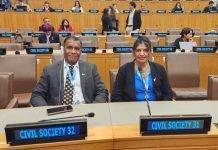GREAT BAY, Sint Maarten (DCOMM) – Health care providers are being asked to register to attend the Antimicrobial Resistance (AMR) Information Session.
The information session will be held on Tuesday, November 13 at 6.45pm at the Vineyard Office Park, Philipsburg, Conference Room at the Ministry of Public Health.
Health care providers are asked to RSVP by sending an email to: surveillance@sintmaartengov.
The information session will cover some local data and will be presented by Microbiologist from the St. Maarten Laboratory Services (SLS) R. Steingrover and a presentation of a case scenario by Internist Samay Nadery from the St. Maarten Medical Center.
The United Nations (UN) health agency, the World Health Organization (WHO), has embarked on a campaign to make antibiotic resistance a globally recognized health issue and to raise awareness of the need to protect antibiotics through appropriate use.
The information session is being organized by the Collective Prevention Services (CPS), a department in the Ministry of Public Health, Social Development and Labour (Ministry VSA), in connection with World Antibiotic Awareness Week (WAAW) which is from November 12-18.
AMR happens when microorganisms such as bacteria, fungi, viruses and parasites change when they are exposed to antimicrobial drugs such as antibiotics, antifungals, and antivirals.
Microorganisms that develop antimicrobial resistance are sometimes referred to as “superbugs.” Medicines become ineffective and infections persist in the body, increasing the risk of spread to others.
Antimicrobial resistance is a global concern because new resistance mechanisms are emerging and spreading globally, threatening our ability to treat common infectious diseases, resulting in prolonged illness, disability, and death.
Without effective antimicrobials for prevention and treatment of infections, medical procedures such as organ transplantation, cancer chemotherapy, diabetes management and major surgery (for example, caesarean sections or hip replacements) become very high risk.






























